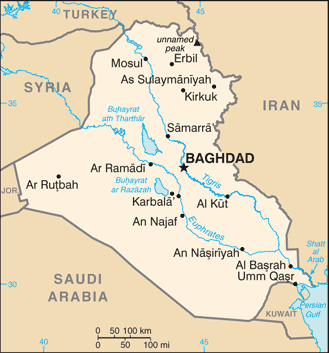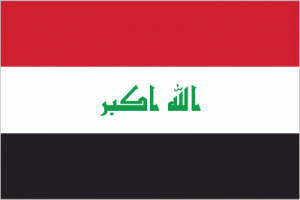Iraq
 Aglow Status: Restricted
Aglow Status: Restricted
(The term “Restricted Nation” as used in Aglow is a nation where it is difficult or dangerous to be a Christian. Therefore the status of Aglow in nations indicated as Restricted is withheld.)
Capital: Baghdad
Pray:
- Pray for all the resources and creativity needed to fulfill the intentions of God in the nation of Iraq.
- Pray for godly government leaders. Blessed is the nation whose God is The Lord, the people whom He has chosen for His own inheritance. Psalm 33:12
Proclaim:
- Arise, shine; for your light has come! And the glory of the LORD is risen upon you. For behold, the darkness shall cover the earth, and deep darkness the people; but the LORD will arise over you, and His glory will be seen upon you. Isaiah 60:1,2 (NKJV)
- Lift up your heads, O you gates! Lift up, you everlasting doors! And the King of glory shall come in. Who is this King of glory? The Lord of hosts, He is the King of glory. Selah Psalm 24:9-10 (NKJV)
Interesting Facts About Iraq
 Background: Formerly part of the Ottoman Empire, Iraq was occupied by the United Kingdom during World War I and was declared a League of Nations mandate under UK administration in 1920. Iraq attained its independence as a kingdom in 1932. It was proclaimed a “republic” in 1958 after a coup overthrew the monarchy, but in actuality, a series of strongmen ruled the country until 2003. The last was SADDAM Husayn from 1979 to 2003. Territorial disputes with Iran led to an inconclusive and costly eight-year war (1980-88). In August 1990, Iraq seized Kuwait but was expelled by US-led UN coalition forces during the Gulf War of January-February 1991. After Iraq’s expulsion, the UN Security Council (UNSC) required Iraq to scrap all weapons of mass destruction and long-range missiles and to allow UN verification inspections. Continued Iraqi noncompliance with UNSC resolutions led to the Second Gulf War in March 2003 and the ouster of the SADDAM Husayn regime by US-led forces.
Background: Formerly part of the Ottoman Empire, Iraq was occupied by the United Kingdom during World War I and was declared a League of Nations mandate under UK administration in 1920. Iraq attained its independence as a kingdom in 1932. It was proclaimed a “republic” in 1958 after a coup overthrew the monarchy, but in actuality, a series of strongmen ruled the country until 2003. The last was SADDAM Husayn from 1979 to 2003. Territorial disputes with Iran led to an inconclusive and costly eight-year war (1980-88). In August 1990, Iraq seized Kuwait but was expelled by US-led UN coalition forces during the Gulf War of January-February 1991. After Iraq’s expulsion, the UN Security Council (UNSC) required Iraq to scrap all weapons of mass destruction and long-range missiles and to allow UN verification inspections. Continued Iraqi noncompliance with UNSC resolutions led to the Second Gulf War in March 2003 and the ouster of the SADDAM Husayn regime by US-led forces.
In October 2005, Iraqis approved a constitution in a national referendum and, pursuant to this document, elected a 275-member Council of Representatives (COR) in December 2005. The COR approved most cabinet ministers in May 2006, marking the transition to Iraq’s first constitutional government in nearly a half century. Iraq held elections for provincial councils in all governorates in January 2009 and April 2013 and postponed the next provincial elections, originally planned for April 2017, until 2019. Iraq has held three national legislative elections since 2005, most recently in May 2018 when 329 legislators were elected to the COR. Adil ABD AL-MAHDI assumed the premiership in October 2018 as a consensus and independent candidate – the first prime minister who is not an active member of a major political bloc. However, widespread protests that began in October 2019 demanding more employment opportunities and an end to corruption prompted ABD AL-MAHDI to announce his resignation on 20 November 2019.
Between 2014 and 2017, Iraq was engaged in a military campaign against the Islamic State of Iraq and ash-Sham (ISIS) to recapture territory lost in the western and northern portion of the country. Iraqi and allied forces recaptured Mosul, the country’s second-largest city, in 2017 and drove ISIS out of its other urban strongholds. In December 2017, then-Prime Minister Haydar al-ABADI publicly declared victory against ISIS while continuing operations against the group’s residual presence in rural areas. Also in late 2017, ABADI responded to an independence referendum held by the Kurdistan Regional Government by ordering Iraqi forces to take control of disputed territories across central and northern Iraq that were previously occupied and governed by Kurdish forces.
Government Type: federal parliamentary republic
Population: 39,650,145 (July 2021 est.)
Ethnic Groups: Arab 75-80%, Kurdish 15-20%, other 5% (includes Turkmen, Yezidi, Shabak, Kaka’i, Bedouin, Romani, Assyrian, Circassian, Sabaean-Mandaean, Persian)
Note: data is a 1987 government estimate; no more recent reliable numbers are available
Languages: Arabic (official), Kurdish (official), Turkmen (a Turkish dialect), Syriac (Neo-Aramaic), and Armenian are official in areas where native speakers of these languages constitute a majority of the population
Religions: Muslim (official) 95-98% (Shia 64-69%, Sunni 29-34%), Christian 1% (includes Catholic, Orthodox, Protestant, Assyrian Church of the East), other 1-4% (2015 est.)
Note: while there has been voluntary relocation of many Christian families to northern Iraq, the overall Christian population has decreased at least 50% and perhaps as high as 90% since the fall of the SADDAM Husayn regime in 2003, according to US Embassy estimates, with many fleeing to Syria, Jordan, and Lebanon
Interesting Facts information from the cia.gov website. Read more about Iraq
